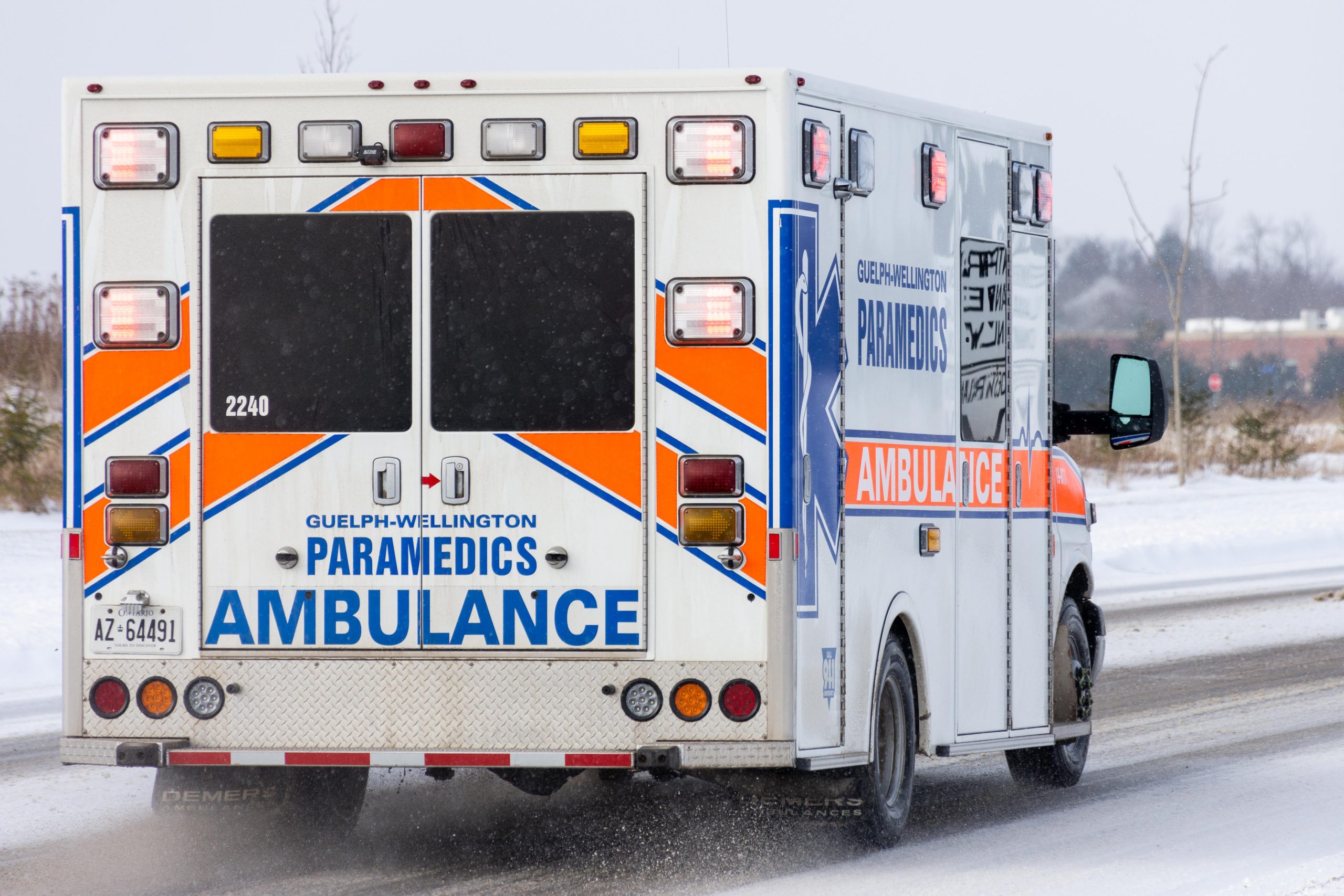GUELPH – Ambulances are being pulled from the county to respond to calls within Guelph because of lengthier offload delays experienced by Guelph-Wellington Paramedic Services (GWPS) paramedics at Guelph General Hospital.
Offload delays are experienced when patients are unable to be transferred into the care of hospital staff in a timely manner.
Until that transfer of care occurs, paramedics continue to provide patient care and remain unavailable to respond to other emergencies.
“The number and length of delays at Guelph General Hospital (GGH) have been increasing for several months,” GWPS chief Stephen Dewar stated in a March 9 report presented to the county’s social services committee.
According to the report, delays increased “significantly” and for “prolonged” periods beginning in August last year.
By October, offload delays had turned into a near-daily occurrence, with between three and eight paramedic crews waiting to transfer patients into the hospital’s care – in some cases for over four hours.
“Having [fewer] than four ambulances available is a concern for us, and we reach that threshold almost daily when there are offload delays,” Dewar stated in an email to the Advertiser.
Data collected by the service illustrates the trend.
In January, paramedics spent 504 hours in offload delays, with delays growing steadily in proceeding months before increasing by 39 per cent from 687 hours in August to 958 hours in September.
Prior to August, the largest increase in offload delays had been a 34% jump from June to July.
According to provincial standards, transfers are supposed to occur “within 30 minutes of the ambulance arriving at the hospital, 90 per cent of the time.”
On average, in October, crews waited 39 minutes to offload patients and in 10% of cases, delays of 87 minutes and above were observed.
Accumulated offload time that month rose to, and peaked at, 1,051 hours.
Hospital administration, meeting with GWPS at the end of the year, cited an increased number of patients in the emergency department with COVID symptoms and operating pressures as contributors to the delays.
Ontario Health data for that month shows the average offload time at GGH was 40 minutes, and in 10% of cases, crews were on offload for 92 minutes – over an hour beyond the province’s direction given to hospitals.
Dewar noted in his email that the average offload time only increased by a single minute last year over an eight-year average of 28 minutes between 2012-20.
It’s the recent trend that concerns Dewar.
“In the past, these volumes were relatively predictable and consistent,” he said. “The variations mean that it is more difficult to predict and plan for surges, and to be prepared for higher volumes that lead to offload delays.”
GGH spokesperson Perry Hagerman attributes delays in the emergency department to how busy the hospital is overall.
“If all hospital beds are full, patients needing to be admitted have to wait in our emergency department,” Hagerman stated in an email.
“When that happens, the department fills up and there’s less room for new patients arriving by ambulance.”
Continuing, the spokesman said ambulance crews “sometimes” are put in a situation that requires waiting with the patient until a space opens up in the department.
He noted the issue isn’t unique to GGH.
Response times and offload delays
With ambulances held up at GGH, some of the county’s eight daytime ambulances are having to respond from a distance to cover emergency calls in the city.
“Code red” scenarios, when no local ambulances are available service-wide to respond to emergencies, have been avoided with the exception of once such occurrence in December lasting under a minute.
(Neighbouring services will be called upon if local trucks are unavailable.)
However, Dewar noted “frequent episodes” in his report when no ambulances were available to respond in Guelph, with crews having to come from over 30 minutes away.
The shuffle draws on county resources and lengthens response times throughout the service’s 2,600-square-kilometre response area.
The service doesn’t track how many times ambulances crossed county boundaries into the city and vice-versa during heightened offload delays, but data provided by Dewar to the Advertiser shows average emergency response times in the latter half of 2021 were consistently higher when compared to the first half of the year.
Responding to delays
As of January, an average offload delay lasted 33 minutes and 10 seconds at GGH, down from the previous four months. But in 10% of cases, delays remained above an hour, consistent with the previous four months.
Dewar remains hopeful issues will resolve “with the ebbing of the COVID pandemic in hospital” but said he needs to plan for the worst.
In the presentation to the committee, the paramedic chief said the service’s community paramedicine program works to reduce emergency calls coming from Guelph and paramedics are utilizing alternate destination medical directives to avoid emergency departments.
The Advertiser has previously reported on the potential for a treat-and-release option for paramedics treating patients with symptoms associated with COVID.
Another possible solution to the problem could be a provincially-funded nursing position dedicated to caring for patients stuck in offload delay limbo. Although the province isn’t offering funding for this area, Dewar notes in his report the province suggests a willingness to consider a funding request.
“[Guelph] staff has had initial discussions with [GGH] on a joint application for funding under this program,” Dewar states.
As of Monday, the paramedic chief didn’t have an update beyond stating the province had asked the service “some clarifying questions” but had not provided a definitive answer.
Hagerman confirmed GGH is working with GWPS to explore “a few different solutions” – one being a dedicated offload nurse – but he was unable to provide specifics.




